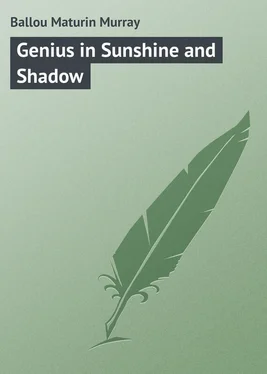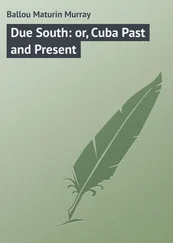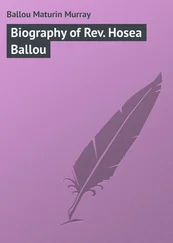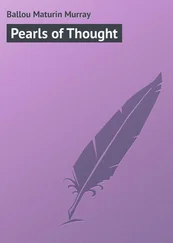Maturin Ballou - Genius in Sunshine and Shadow
Здесь есть возможность читать онлайн «Maturin Ballou - Genius in Sunshine and Shadow» — ознакомительный отрывок электронной книги совершенно бесплатно, а после прочтения отрывка купить полную версию. В некоторых случаях можно слушать аудио, скачать через торрент в формате fb2 и присутствует краткое содержание. Жанр: foreign_prose, foreign_humor, Анекдоты, на английском языке. Описание произведения, (предисловие) а так же отзывы посетителей доступны на портале библиотеки ЛибКат.
- Название:Genius in Sunshine and Shadow
- Автор:
- Жанр:
- Год:неизвестен
- ISBN:нет данных
- Рейтинг книги:4 / 5. Голосов: 1
-
Избранное:Добавить в избранное
- Отзывы:
-
Ваша оценка:
- 80
- 1
- 2
- 3
- 4
- 5
Genius in Sunshine and Shadow: краткое содержание, описание и аннотация
Предлагаем к чтению аннотацию, описание, краткое содержание или предисловие (зависит от того, что написал сам автор книги «Genius in Sunshine and Shadow»). Если вы не нашли необходимую информацию о книге — напишите в комментариях, мы постараемся отыскать её.
Genius in Sunshine and Shadow — читать онлайн ознакомительный отрывок
Ниже представлен текст книги, разбитый по страницам. Система сохранения места последней прочитанной страницы, позволяет с удобством читать онлайн бесплатно книгу «Genius in Sunshine and Shadow», без необходимости каждый раз заново искать на чём Вы остановились. Поставьте закладку, и сможете в любой момент перейти на страницу, на которой закончили чтение.
Интервал:
Закладка:
Among these is that of Edmund Burke, on the whole the greatest of English philosophical statesmen. He is the most remarkable instance of a number of men of genius who seem to have grown younger as they grew older, – that is, mentally and morally. Macaulay has noticed that Bacon's writings towards the close of his career exceeded those of his youth and manhood "in eloquence, in sweetness and variety of expression, and in richness of illustration." 37 37 Lord Brougham hoped to see the day when every man in the United Kingdom could read Bacon. "It would be much more to the purpose," said Cobbett, "if his lordship could use his influence to see that every man in the kingdom could eat bacon."
He adds: "In this respect the history of his mind bears some resemblance to the history of the mind of Burke. The treatises on the 'Sublime and Beautiful,' 38 38 On a certain occasion when Barry, the eminent painter, exhibited one of his admirable pictures, some one present doubted that it was his work, so remarkable was its excellence, and Barry at the time had not established any special fame. The artist was so affected by the remark that he burst into tears and retired. Burke, who was present, followed him to pacify his grief. The painter by chance quoted some passages of the newly published essay on the "Sublime and Beautiful." It appeared anonymously, and Burke took occasion to sneer at it, when Barry showed more feeling than he had done about his picture. He commended the essay in the most earnest language. Burke, smiling, acknowledged its authorship. "I could not afford to buy it," replied the astonished artist, "but I transcribed every line with my own hands;" at the same time pulling the manuscript from his pocket. This was commendation so sincere and appreciative, that the great author and the great painter clasped hands in mutual friendship.
though written on a subject which the coldest metaphysician could hardly treat without being occasionally betrayed into florid writing, is the most unadorned of Burke's works. It appeared when he was twenty-five or twenty-six. When, at forty, he wrote the 'Thoughts on the Causes of the Present Discontents,' his reason and judgment had reached their full maturity, but his eloquence was in its splendid dawn. At fifty his rhetoric was as rich as good taste would admit; and when he died, at almost seventy, it had become ungracefully gorgeous. In his youth he wrote on the emotions produced by mountains and cascades, by the masterpieces of painting and sculpture, by the faces and necks of beautiful women, in the style of a Parliamentary report. In his old age he discussed treaties and tariffs in the most fervid and brilliant language of romance."
Socrates learned to play on musical instruments in his old age. Cato at eighty first studied the Greek language, and Plutarch did not apply himself to learn the Latin language until about the same age. Theophrastus 39 39 Menander, the poet, was Theophrastus's favorite pupil.
began his "Character of Man" on his ninetieth birthday. Peter Rusard, one of the fathers of French poetry, did not develop his poetic faculty until nearly fifty. Arnauld, the learned French theologian and philosopher, translated Josephus in his eightieth year. Lope de Vega, one of the most learned men of the sixteenth century, wrote his best at seventy years of age. Dr. Johnson applied himself to learn the Dutch language at seventy. At seventy-three, when quite feeble, he composed a Latin prayer to test to his own satisfaction the loss or retention of his mental faculties. Chaucer's "Canterbury Tales" were the work of the author's last years. Franklin's philosophical pursuits were but fairly begun at fifty. La Mothe le Vayer's best treatises were written after he was eighty years of age, and Izaak Walton's when he was nearly ninety. Thomas Hobbes, the remarkable English philosopher and author, published his version of the Odyssey in his eighty-seventh year, and his Iliad in his eighty-eighth. Winckelmann, 40 40 Winckelmann, one of the most distinguished writers on classic antiquities and the fine arts, was the son of a shoemaker. He contrived, by submitting to all sorts of personal deprivation, to fit himself for college, and to go through with the studies there by teaching young and less advanced fellow-students, at the same time supporting a bedridden and helpless father.
author of the "History of Ancient Art," lived in ignorance and obscurity until the prime of his life, when he became famous. Landor was busy with authorship until after he was eighty. The Earl of Chatham made his most remarkable oratorical effort at seventy, and our own American orator and statesman, Robert C. Winthrop, at a still later period of his life. Fontenelle continued his literary pursuits until he was ninety-nine, "blossoming in the winter of his days," as Lord Orrery wrote of him. Ménage, the celebrated French critic and scholar, wrote sonnets and epigrams at ninety. Julius Scaliger, the renowned Italian scholar and poet, dictated to his son, at the age of seventy, two hundred verses of his own composition from memory. Mr. Gladstone and John Bright, the English statesmen, are more recent examples of oratorical, mental, and physical powers in advanced years. George Bancroft the American historian, in his eighty-sixth year is still engaged in authorship, and Whittier and Holmes are writing with unabated vigor at nearly eighty years of age. Miss Elizabeth Peabody at eighty-four is still a vigorous writer and active philanthropist, and the same may be said of Mrs. Julia Ward Howe at the age of sixty-six. Mrs. Howe, indeed, is one of the foremost of American women, whether we regard the ripeness of her scholarship, the breadth of her understanding, the richness of her imagination, or the quiet intrepidity with which she champions great reforms.
CHAPTER II
Who does not enjoy recalling these silent friends, favorite authors grown dear to us by age and long association? Some one has said that authors, like coins, grow dearer as they grow old. Indeed, Samuel Rogers, the banker and poet, declared that when friends at his famous "breakfasts" were praising a new book, he forthwith began to re-read an old one. All these writers were double-sided, so to speak; they had their book natures and their human natures, and it is when we prefer to contemplate them in the latter aspect that we like them best. Carlyle calls them "the vanguard in the march of mind, the intellectual backwoodsmen reclaiming from the idle wilderness new territory for the thought and activity of their happier brethren." It is true that we can form but a partial judgment of authors by their books, their motives being not always as pure as we are inclined to believe. 41 41 "People may be taken in once, who imagine that an author is greater in private life than other men," says Dr. Johnson.
A traitor like Bolingbroke is quite capable of writing a captivating book on patriotism; and it has been said if Satan were to write one, it would be upon the advantages of virtue.
It is certain he has ever shown such a hearty appreciation of virtue that he holds in highest estimation his success in corrupting it. Examples flash across the memory. There was Sir Thomas More advocating toleration, while he was himself a fierce persecutor; Sallust declaring against the licentiousness of his age, yet addicted to habitual debaucheries; Byron assuming a misanthropy which he never felt; and Cowley boasting of his mistresses, though he had not the courage even to address one. Smollett's descriptions and scenes were often indelicate, though he was himself in that respect a faultless man. "As a rule, the author who is not in genius far above his productions must be a second-rate one at best," says Bulwer-Lytton. Sometimes we detect striking likenesses between the author and his works. Goldsmith, for instance, was the same hero to low-bred women, and the same coward to ladies, that he depicts in his charming comedy. It is difficult, however, in the light of Handel's inspired music, to realize what an animal nature possessed him in his every-day mood, – what a glutton he was at table; or to reconcile the sublime strains of Mozart with his trivial personality. 42 42 Such incongruities do exist: nothing is infallible; phrenologists even find the crania of some men to exhibit contradictory evidences. When Sydney Smith with some friends submitted his head to be examined by a phrenologist who did not know him, the party were amused at the examiner declaring him to be a great naturalist, – "never happier than when arranging his birds and fishes." "Sir," said the divine, "I don't know a fish from a bird!"
Still, Buffon persistently declares, "Le style c'est l'homme."
Интервал:
Закладка:
Похожие книги на «Genius in Sunshine and Shadow»
Представляем Вашему вниманию похожие книги на «Genius in Sunshine and Shadow» списком для выбора. Мы отобрали схожую по названию и смыслу литературу в надежде предоставить читателям больше вариантов отыскать новые, интересные, ещё непрочитанные произведения.
Обсуждение, отзывы о книге «Genius in Sunshine and Shadow» и просто собственные мнения читателей. Оставьте ваши комментарии, напишите, что Вы думаете о произведении, его смысле или главных героях. Укажите что конкретно понравилось, а что нет, и почему Вы так считаете.












